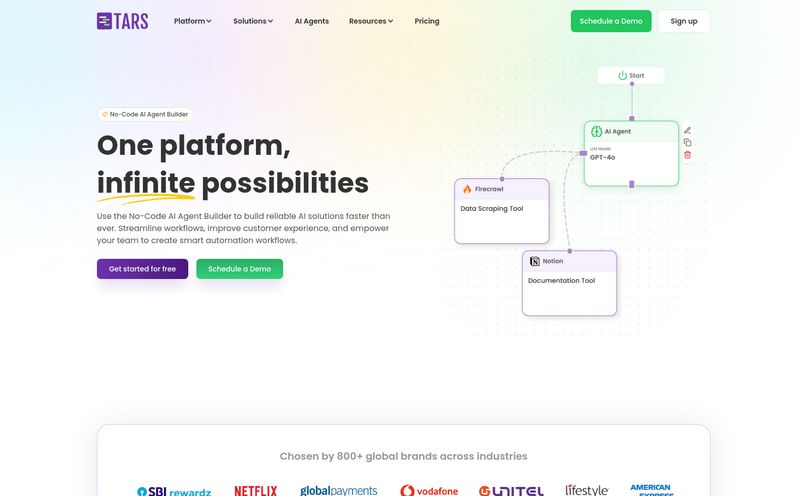Every single day, my inbox gets flooded with pitches for the “next big AI tool.” It’s a constant barrage of productivity hacks, content spinners, and soulless chatbots. Most of them feel the same—cold, corporate, and frankly, a little bit creepy about how they handle your data. So, when I first heard about Kin, I was skeptical. Another AI companion? Yawn. But then I looked closer.
This one felt... different. It wasn’t screaming about 10x-ing your output. Instead, it was quietly talking about emotional intelligence, privacy, and Scandinavian design. It felt less like a tool to be wielded and more like a space to be inhabited. And the headline feature—a smart, long-term memory—piqued my interest as an SEO who lives and breathes information management. Could this be the personal AI we've actually been waiting for?

Visit Kin
What Exactly is Kin AI? (And Why Should You Care?)
At its core, Kin is a personal AI designed to be your private confidant and coach. Think of it less like a search engine you query and more like a thinking partner. It’s built to help you navigate, as their site puts it, “the thorns of life.” That’s a pretty poetic mission for a piece of software, right?
It’s proudly made in Copenhagen, Denmark, and you can feel that Scandinavian influence everywhere. The interface is clean, minimal, and functional. There's no clutter. It’s designed to bring you clarity, not add to the digital noise. The whole idea is to have an intelligent partner on your phone that helps you organize your thoughts, plan your goals, and just get through the day-to-day without feeling like you’re feeding your deepest secrets to a massive corporate server. And honestly? That's a breath of fresh air.
The "Smart Memory" Feature is a Genuine Game Changer
Let's get to the meat of it. The one feature that made me sit up and pay attention is Kin’s “smart, long-term memory.” This isn't just about chat history. Kin is designed with an episodic memory, meaning it remembers the context of your past conversations and experiences. It connects the dots over time.
Imagine this: You tell your AI about a stressful project at work. A month later, you mention you’re feeling burned out. Instead of giving you a generic definition of burnout, Kin can say, “I remember you were dealing with that big project last month. Could that be contributing to how you’re feeling now?” That’s not just data retrieval; it’s a form of digital empathy. It’s like having a friend who actually listens and remembers the little things. This transforms the AI from a simple utility into a real companion. Scott Belsky, the founder of Behance, is quoted on their site saying, "The game changes when AI remembers everything you've ever discussed." He's not wrong.
Privacy Isn't an Afterthought, It's the Foundation
Here's the part that really sold me. In an era where our data is the product, Kin takes a hard left turn. All your data, your conversations, your journal entries—it’s all encrypted and stored locally on your device. It’s not uploaded to some giant, faceless cloud where it can be analyzed, sold, or leaked. This is huge.
For me, this is the difference between a tool I’ll use for trivial tasks and one I’d actually trust with my personal thoughts. I’m not going to do any deep journaling or problem-solving with an AI if I’m worried about who might be reading it. Kin’s “local-first” approach means your privacy is structurally guaranteed. It’s a bold move, and one that directly challenges the business models of many big tech players.
Putting Kin to Work: Core Features and Use Cases
So, beyond having a great memory and respecting your privacy, what does Kin actually do? Here’s a breakdown of how you might use it day-to-day.
Smart Journaling for a Clearer Mind
Instead of just typing into a blank page, journaling with Kin is interactive. You can talk through your day, and the AI can ask follow-up questions, helping you dig a little deeper. Over time, it can help you spot patterns in your moods or habits. It’s like having a guided journal that’s perfectly personalized to you.
AI Coaching and Problem Solving
This is where the companion aspect shines. Feeling stuck on a decision? Talk it out with Kin. Whether you're mapping out career goals or just trying to figure out a tricky social situation, the AI acts as a sounding board. Because it remembers your past goals and values, its suggestions can be surprisingly insightful.
Integrations That Make Sense
Kin isn’t trying to be a walled garden. It plans to integrate with the apps you already use, starting with Google Calendar. This means it can offer intelligent reminders and help you plan your time based on your actual schedule. I’m looking forward to seeing how this expands. Imagine it connecting to your to-do list app or your fitness tracker. The potential is massive.
The Conversational Voice Chat Experience
Sometimes it’s just easier to talk than to type. Kin’s conversational voice chat lets you interact hands-free, making it feel even more like a natural conversation. This is perfect for when you’re on a walk or driving and an idea strikes. It lowers the barrier to capturing your thoughts.
My Honest Take: The Good and The Not-So-Good
No tool is perfect, especially one in its early stages. Here’s my balanced view:
What I love about Kin is its philosophy. The focus on emotional intelligence, the unwavering commitment to privacy, and the smart memory are a powerful combination. It feels like a tool built by humans who actually care about mental well-being and digital sovereignty. It’s an antidote to the impersonal, data-hungry tech that dominates our lives.
However, we have to acknowledge the reality of its current state. Kin is in public beta, which means it’s a work in progress. You might run into a few rough edges. The website mentions the desktop version isn't fully optimized yet, so it’s primarily a mobile-first experience for now. This could be a dealbreaker for people who do their deep thinking at a computer. But the team seems transparent about this, with a promise of weekly improvements.
What's the Price? The Kin AI Pricing Model
Let's address the elephant in the room: cost. The FAQ on their site is upfront about this. While you can join the beta now, Kin will eventually be a subscription-based service. And you know what? I’m happy to hear it.
When a product is free, you are the product. A subscription model means their incentive is to build the best possible tool for you, the user, not for advertisers. It aligns their success with your satisfaction. We don’t have specific pricing tiers yet, but I’d rather pay a reasonable monthly fee for a private, secure, and constantly improving AI companion than use a “free” one with hidden costs to my privacy.
Frequently Asked Questions About Kin
I've gathered some of the most common questions people have about Kin.
Do I need a subscription to use Kin?
Currently, Kin is in a free public beta. However, the plan is to move to a subscription model in the future to support its development and maintain its privacy-first stance without relying on ads or selling data.
How does Kin's memory work?
Kin uses what it calls an "episodic memory." It remembers the context of your conversations over time, allowing it to connect new information with past discussions. All this memory is stored securely on your device.
Can I use Kin on my desktop?
Right now, Kin is designed as a mobile-first experience. While there might be a way to access it on a desktop, it's not fully optimized yet. This is something they are likely working on as they move out of beta.
What other apps can Kin connect to?
The first major integration is with Google Calendar. The team plans to add more third-party app integrations in the future to make Kin a more central part of your digital life.
Is Kin just another version of ChatGPT?
No. While it is powered by open source language models, Kin is a specialized product. Its focus is on long-term memory, privacy, and personalized coaching, rather than general-purpose information retrieval. It's built to know you, not just the internet.
Final Thoughts: Is Kin the Future of Personal AI?
I’ve seen a lot of AI tools come and go. Most are flashes in the pan. Kin feels different. It feels more... substantial. It's not trying to be the flashiest or the loudest tool in the box. Instead, it’s building a foundation of trust, privacy, and genuine intelligence.
It’s for the person who wants more than just a search engine—they want a thinking partner. It's for the person who values their privacy as much as their productivity. If you're tired of the cold, impersonal nature of modern tech and are looking for an AI that feels more human, I think you should absolutely join the Kin beta. It might just be the quiet, intelligent companion you've been searching for.
Reference and Sources
- Kin Official Website - For product information and to join the public beta.



